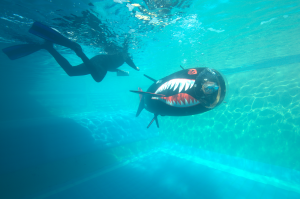The Department of Engineering Science hosts undergraduate degrees in both Engineering Science and Biomedical Engineering. I enjoy seeing examples of how the natural world can offer solutions to traditional engineering problems. Much of my own work is in geothermal energy and one example in that industry is the bioreactor at Contact Energy's Wairakei plant that removes hydrogen sulphide from cooling water used in the plant, before the water is discharged to the Waikato river. In the bioreactor the cooling water flows through 378km of pipes in which sulphur-oxidising bacteria floursh and remove 80% of the hydrogen sulphide. The bioreactor is a world first, and was New Zealand Energy Project of the Year in the Deloitte Energy Awards.
At the University I enjoy seeing the developments that come out of the Auckland Biomimetics Lab, hosted in the Auckland Bioengineering Institute, and run by Associate Professor Iain Anderson. The work done in the lab involves
"drawing inspiration from nature to develop new technologies. Living organisms and natural phenomena have certain behaviours and properties which let them exist in harmony with the surrounding environment. By understanding these natural processes, we are developing technologies to venture into new territories."
One of the lab's projects is building a human powered racing submarine (known as "Project Taniwha") which they race in an international contest each year. This year the team won the overall trophy, as well as awards for being the most reliable submarine and the best non-propeller powered submarine. The team are the only Southern Hemisphere team. Curious how such a vehicle works? It's pedal-powered, with a diver inside who breathes from a dive tank.
“We also got the reliability trophy because we didn’t abort once in 18 runs around the circuit,” says Iain. “That’s about five kilometres underwater. New Zealand has proven to the world that Taniwha is a top sub with a top team.”
“They were very impressed with our innovative bending tail on the sub that takes the place of a rudder,” says Iain. “The rear section of the Taniwha bends back and forth like a fish and enables the Taniwha to turn without a rudder.”
The Taniwha is a great mix of creativity, determination, and Kiwi enginuity - with some inspiration from nature. If you're visiting our Department (at Uniservices House, 70 Symonds St) you will see it on display on the ground floor level. I know there's not a huge market for human power submarines ... however the Biomimetics Lab also applies it's expertise to a range of other ventures with commercial impact, including a spin-out company called Stretchsense which develops wearable technologies.


